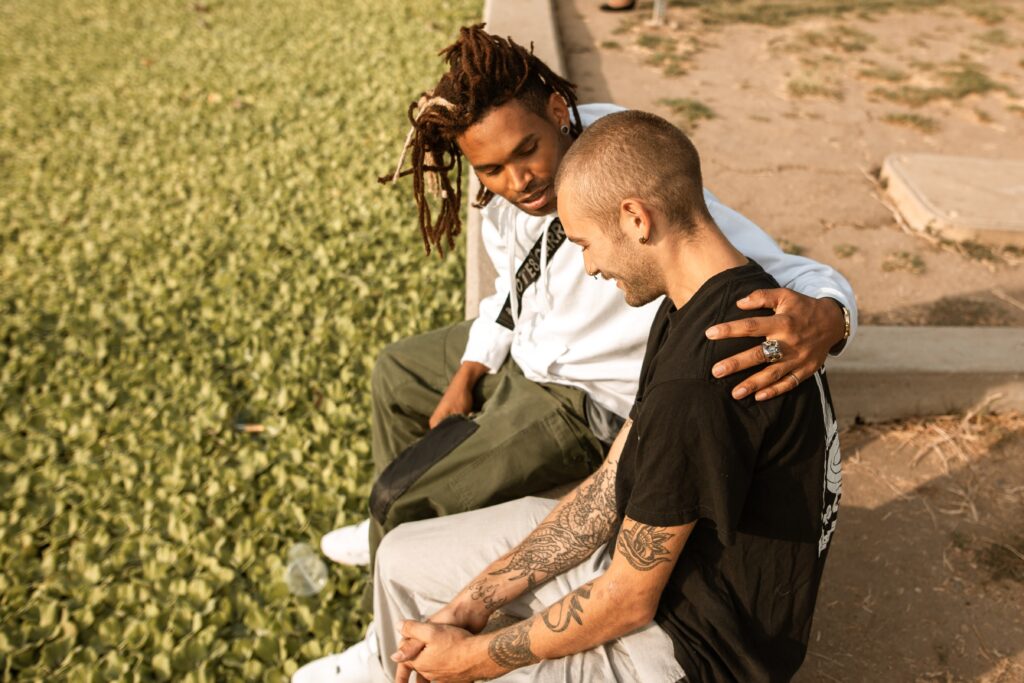
Grief is a natural response to change or loss in our lives. There are many reasons for someone to experience grief, through the death of a friend or family member, when someone close to you is ill or through the loss of a relationship. As well as impacting our emotions and thinking, grief can have a physical impact on our bodies. It is important to remember that everyone will experience grief in their own unique way but it can be common for people to become isolated from friends and family. Grief is a journey and although that journey is personal, you can always get help along the way.
This article offers some advice and support on how to cope with grief or how to help someone close to you who is grieving.
What to Expect
When you lose someone it is natural to feel shock, sadness, anger, numbness, relief or guilt. You may feel loads of emotions, very few emotions or feel numb and not feel anything at all, all are normal responses. This affect your outward emotions, you may find that you’re crying a lot or you aren’t able to cry at all. Feelings of anger can also make you feel disconnected from your friends and family. Just remember, there is no right or wrong way to feel and the loss you have suffered is not your fault. Grief has physical effects too, it can disturb your sleep, make you feel fatigued and tired and cause physical pains like headaches. It may also change eating patterns, some people lose their appetite and some people comfort eat. Anxiety and panic attacks can also be caused by grief. Grief can affect your ability concentrate on work or school, cause you to lose enthusiasm for things you once loved and it may also cause you to take more risks with drinking alcohol, taking drugs or having sex.
Taking Time
It takes time to grieve, there is no standard length of time, you just need to take one day at a time. Everyone grieves at their own pace, even people who have suffered the same loss may feel differently at different times. There may be times when you feel sad and didn’t expect it, other times you may prepared to feel sad or upset, such as your ‘firsts’ without the person you lost. During these times, it can be hard but try to focus on the positives and think about happy memories with that person. Just know, your grief won’t last forever, with time and support you will start to feel differently and cope with your loss.
Tips for Coping
It always helps to talk to someone – if you find it hard to talk to someone in your family, you can always speak to a friend, counsellor or your doctor
It’s good to be around people who care about you and understand you when you’re grieving
It can help to write down your feelings, so keep a private journal or diary of how your feeling
Write a letter to the person you lost, this gives you a chance to say anything you want to say and how you feel
Write a song or poem and channel your emotions
Make a playlist of songs that remind you of the person you lost, listen to it when you think of them
Draw or paint to express your feelings
Don’t be afraid to cry, it can be really helpful to let your feelings out
Create a memory box and fill it with photos and items that remind you of the good memories you have with the person you lost
Try Not To
Tell yourself you are alone, there is always someone you can talk to
Don’t avoid your feelings, all your feelings are valid so don’t be afraid to express them
Don’t use alcohol, cigarettes or drugs to relieve your grief, this will only have lasting effects on your mental health
Don’t think that moving forward or not feeling sad mean that you don’t care about the person you’ve lost, you need to live your life
Don’t feel that school or work are less important, you still need to prioritise yourself
How to Help a Friend
Listen – just being there to listen to them can be really helpful, let them know that you are a safe person to talk to
Respect – each person needs time to process their grief, so it’s important to respect their space, their feelings and keep your conversations private
Ask – if you feel they may need someone to talk to or someone to listen, you don’t have to wait for them to say something, ask them
Share – if you’re able to share memories of the person they have lost, share them in a chat, a card or a letter
Help – grief can affect every aspect of people’s lives so you could offer to help with other aspects they might be struggling with, such as school work or work that needs to be done at home
Text – if you’re worried, check in with them and check their ok in a short text or a phone call
Don’t feel rejected if the person grieving doesn’t want to talk to you, they might still need time to adjust to their feelings or not be ready to talk

Support
For grief support, you can speak to a counsellor or your local GP
The Irish Hospice Foundation have a bereavement support line you can freephone (Mon-Fri 10am-1pm) on 1800 80 70 77
If you need to talk to a child about grief or would like bereavement supports for children and adolescents you can email The Irish Childhood Bereavement Network at icbn@hospicefoundation.ie or visit their website at www.childhoodbereavement.ie


